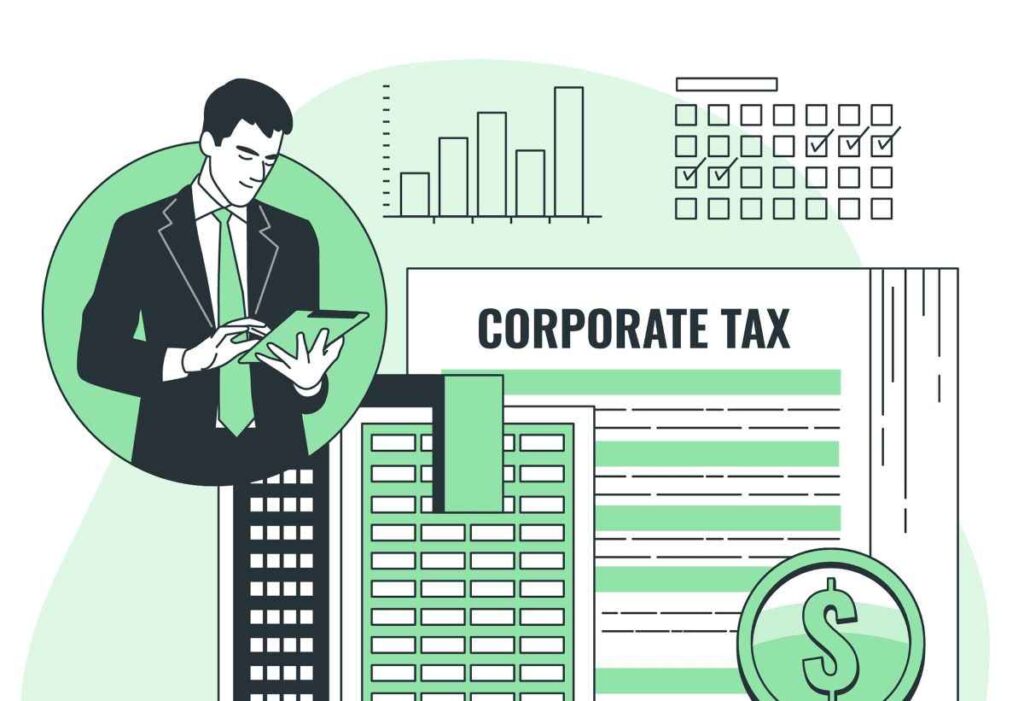Have you recently established a new UK limited company and it’s doing well?
Then, you are required to educate yourself about all the corporation tax essentials for your business. Wondering, what is corporation tax UK?
Don’t know, how to pay corporation tax?
Well! That’s why we are here. The concept of the UK corporation tax is very simple once you get to know about it.
So, keep reading this writeup and we will confide to you everything about corporation tax in the UK.
What Is Corporation Tax, UK?
It’s none other than a corporate tax in the UK which is levied from various limited companies residing in the UK. Also, this tax is collected from those foreign limited companies whose branches are in the UK.
The tax is charged by the UK government mainly from the profit that these companies extract at the end of every year. Also, this tax is levied on the profits that come from selling land, shares, properties, and other assets.
The rate of corporate tax in the UK is 25 per cent at present.
The people of the UK have recently seen this change in corporate tax. This is because, until April 2023, the UK corporate tax rate was 19 per cent.
According to the new corporate tax norm, only the limited companies whose annual taxable profits are above 2,50,000 pounds fall under the 25 per cent tax rate.
The companies whose annual taxable profits are below 50,000 pounds? Well! they will have to pay 19 per cent tax.
And, the companies whose annual taxable profits fall between 50,000 and 2,50,000 pounds? They will have to pay the 26.5 per cent marginal tax rate.
Corporation Tax, UK – Who Should Pay It?
You have already learned, what is corporation tax, in the UK, right?
Now, you should learn that Corporation tax is not only applicable to UK Limited companies. Apart from them, various unincorporated organizations whose annual profit margin falls in the taxable category may also have to pay this tax.
The unincorporated organizations may include different –
- Cooperatives.
- Trade associations & their members.
- Housing associations & their members.
- Clubs.
- Associations.
The payment of the company’s corporation tax is usually done by its directors or their secretaries on their instructions.
They have to ensure that the returns for this company’s tax have been filed in compliance with the HMRC within the appropriate deadline.
Yes, it’s true that legally, the directors of a company are responsible for paying this tax. However, sometimes they employ tax specialist accountants for the job to make the process of tax payment effortless.
How to Pay Corporation Tax?
There are different methods for paying the UK corporation tax. They are –
- Through online payment (Electronically).
- By visiting a bank.
- By visiting a post office.
For the mode of payment, you can choose any of the following –
- CHAPS.
- Over the telephone.
- Online payment.
- Bacs transfer.
- Direct debits.
- Card payment (Debit/Credit card).
By paying your tax through CHAPS, you can expect the same-day processing of your payment. The same is true with Online payment mode and over-the-telephone payment mode.
What if you choose the other options for your corporation tax bill payment? Well! In that case, you have to wait for 3 days or a little more to get the payment confirmation.
For more details regarding the payment option for corporation tax, you can visit the UK Government website.
When Does Corporation Tax Have to Be Paid?
Calculating from the return-covered accounting period’s end, you have to submit the corporation tax return within 1 year.
In the case of the corporation tax bill payment, you have to complete it within 9 months and 1 day, taken from the time of the end of the accounting period.
Large companies are usually given the privilege to clear this tax by paying in instalments. In case a company director surpasses the deadline without making the payment, he/she will be liable for a penalty.
How to Pay Corporation Tax With Penalties After You Surpass The Payment Deadline?
If your corporation tax return date surpasses and you have not done it yet, be prepared to give some penalties for it.
The penalty amount depends on the number of days for which you have not made the payment. A 1-day delay will penalize you with 100 pounds.
For a delay of 3+ months, you will have to pay another 100 pounds. If the delay is done for 6+ months, you have to pay 10 per cent of your unpaid tax as a penalty amount.
In case the delay is for 12+ months, an extra 10 per cent of your unpaid corporation tax has to be paid.
What if you skip making payment of your corporation tax within the mentioned deadline 3 consecutive times? Then the 100 pounds penalty will transform into 500 pounds.
And, what if still the company avoids the payment of the corporation tax along with the penalization amounts? Then proper actions will be taken against it by HMRC. This agency will –
- Get in touch with the debt collection agencies.
- Recover the money amount by directly deducting it from your bank account.
- Recover the money by directly deducting it from your Building Society account.
- Get the required money by selling your assets.
- Take you to court.
- Liquidate your company and make you stop the business.
So, paying corporation tax on time is very much essential. In case you don’t have money to pay it, ask for help from HMRC. The agency will help you by making a payment plan for you.
Be sure to contact them before your deadline arrives. It’s not only applicable for one-time payment of corporation tax.
Even for instalment payments of the tax, submission of the amount in time is necessary to avoid penalties.
Consequences of Filing Corporation Tax Return with False Information:
Sometimes, you enter false information while filing your return. It happens for a person due to many reasons –
- Accidental errors.
- Deliberate inaccuracies.
- Deliberately concealed inaccuracies.
- Offshore issues related to inaccuracies.
Though making mistakes is a normal part of human lives, you must file your tax return with full concentration whenever you go for it.
You must know clearly, what is a corporation tax, the UK, and what are its important aspects. You should proceed with it once you’re sure that you have a proper understanding of this matter.
Sometimes, small errors can cause you big fines. The amount of the penalties varies according to the error’s stringency.
For self-disclosed accidental errors, you will be penalized between 0 to 30 per cent of the amount of your tax bill. For non-disclosed accidental errors, it will be 15 per cent or more.
Deliberate unconcealed inaccuracies if disclosed, will bear a penalty of 20 to 70 percent of the corporation tax bill amount.
For undisclosed inaccuracies of this type, it will be 35 to 70 per cent of the tax bill amount. If the false information is relevant to offshore matters, the penalty may be higher.
Remember, intentionally concealed inaccuracies are considered a serious crime. What if any person does it and discloses it to the HMRC?
He/she will be penalized with 30 to 100 per cent of their tax bill amount. And, in case of non-disclosure of the same? In that case, his percentage of penalty will be between 50 to 100 per cent.
So, you must file your corporation tax return with proper consciousness and without any mistakes or false information. Wondering, when corporation tax has to be paid?
Submit it only after you understand the information properly and fill it up correctly. If you are finding it unable to handle it, hiring a professional person for the same is the best option.
What Is The Trending Corporation Tax Rate in the UK?
In 2010, the rate for corporation tax was 28 per cent. But, it decreased a lot in 2014 and within 2017, the rate sloped down to 19 percent.
The same rate prevailed up to a certain period of April 2023. Then again, the tax was increased to 25 per cent by the UK government. This same corporation tax rate is prevailing at present.
Ring Fence Corporation Tax:
It’s the corporation tax that the oil and gas-producing companies in the UK pay for their profit.
Also, the tax paid by the companies residing in the UK continental shelf comes under its list. The UK continental shelf channels include –
- The North Sea.
- The North Atlantic Ocean.
- The Irish Sea.
- The English Channel.
The main rate for this corporation tax is thirty per cent. Its small profits rate is nineteen per cent.
Information on Corporation Tax Returns About Dividends:
We have already told you, what is corporation tax, in the UK. What you need to know now is its relation with the company’s dividends.
Don’t worry! Corporation tax doesn’t apply to dividends that are provided to its shareholders. However, as per recent income tax law (April 2024), dividends greater than 500 pounds come under the income tax category.
So, you have to pay income tax if the dividend amount exceeds 500 pounds. Paying dividends to your company’s shareholders doesn’t reduce your corporation tax amount.
#Note – If you’re a sole trader, your profit doesn’t call for payment of corporation tax. Instead, it will come in the income tax category.
Ways to Minimize The Bills Of Your Corporation Tax:
Though the profit of a company residing in the UK calls for the payment of corporation tax, it can be reduced with proper planning.
Already learned from us, how to pay corporation tax? Here are some ways to minimize the bill amount of your company’s corporation tax –
- Through capital allowance claims (to get tax concession on property & equipment tax).
- Through R & D tax credits (to get tax concession for innovative companies).
- Claiming for Patent Box tax relief, etc.
In case you can’t sort out, what kind of tax relief claims can benefit you, opt for hiring a tax adviser. He/she will tell you strategically how to reduce the corporation tax bill amount for your company.
FAQS:
1. Who is subject to UK corporation tax?
Any Limited company based in the UK or any foreign company that has a branch/office in the UK comes under this tax category. Recently, the UK corporation tax has been declared as 25 per cent of the profit of these Limited companies.
2. Why is corporation tax so low in the UK?
The reason for the low corporation tax in the UK includes –
- Low productivity levels in the UK.
- Low capital investment levels in the UK.
Conclusion:
Handling the taxes is one of the most crucial aspects, especially for small businesses. However, navigating the complexities of tax regulations is overwhelming too. The HMRC and the UK’s tax authority play a central role in overseeing tax compliance and collection of tax.
To ensure smooth operations, you must understand the HMRC and its interactions with small businesses. You must be aware of all the tax regulations to avoid common pitfalls.
Here, I have provided in-depth insights into small business tax UK, so you can go through my article. Hope, this article will show you the right path to effectively manage your tax obligations.

